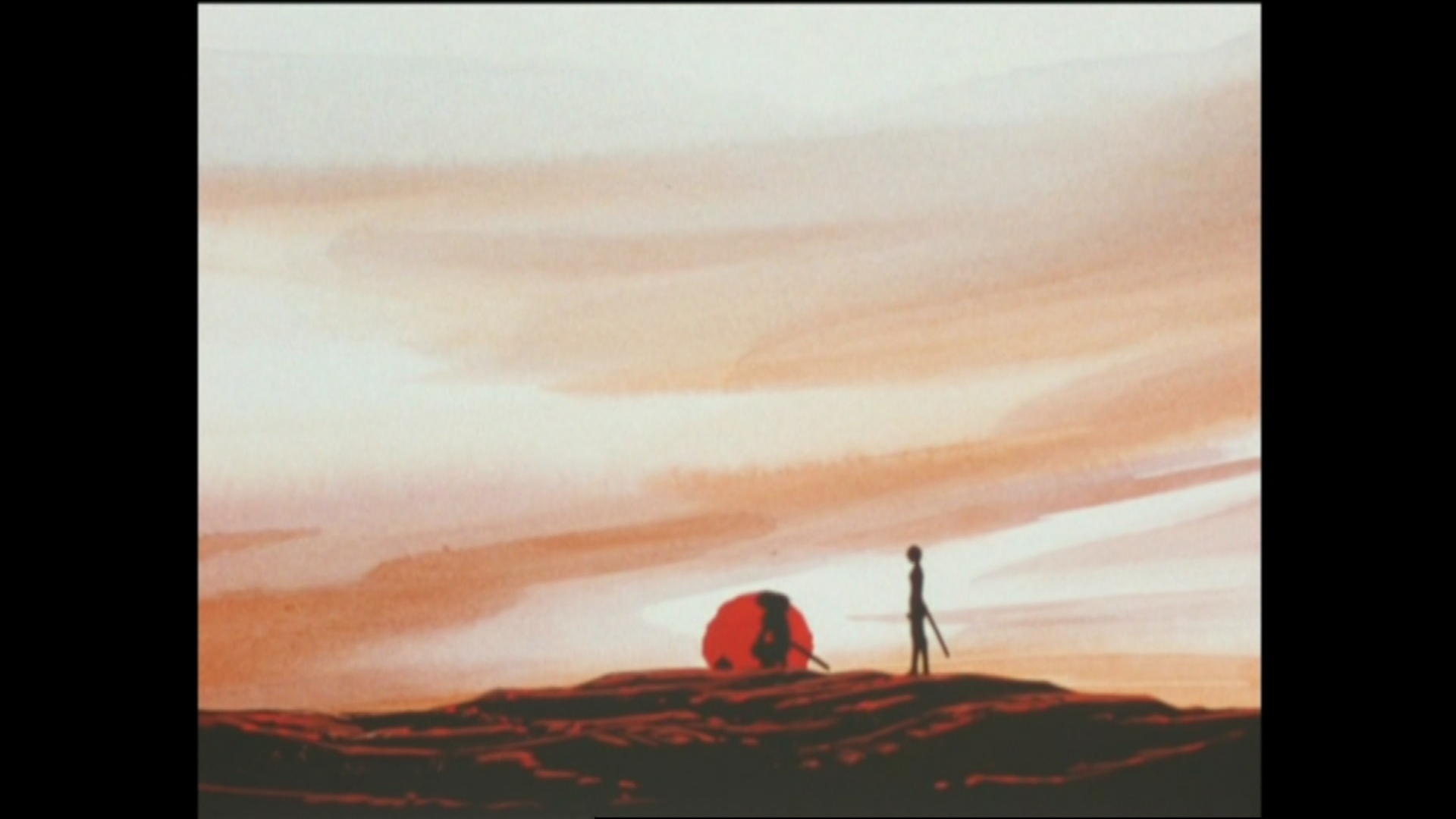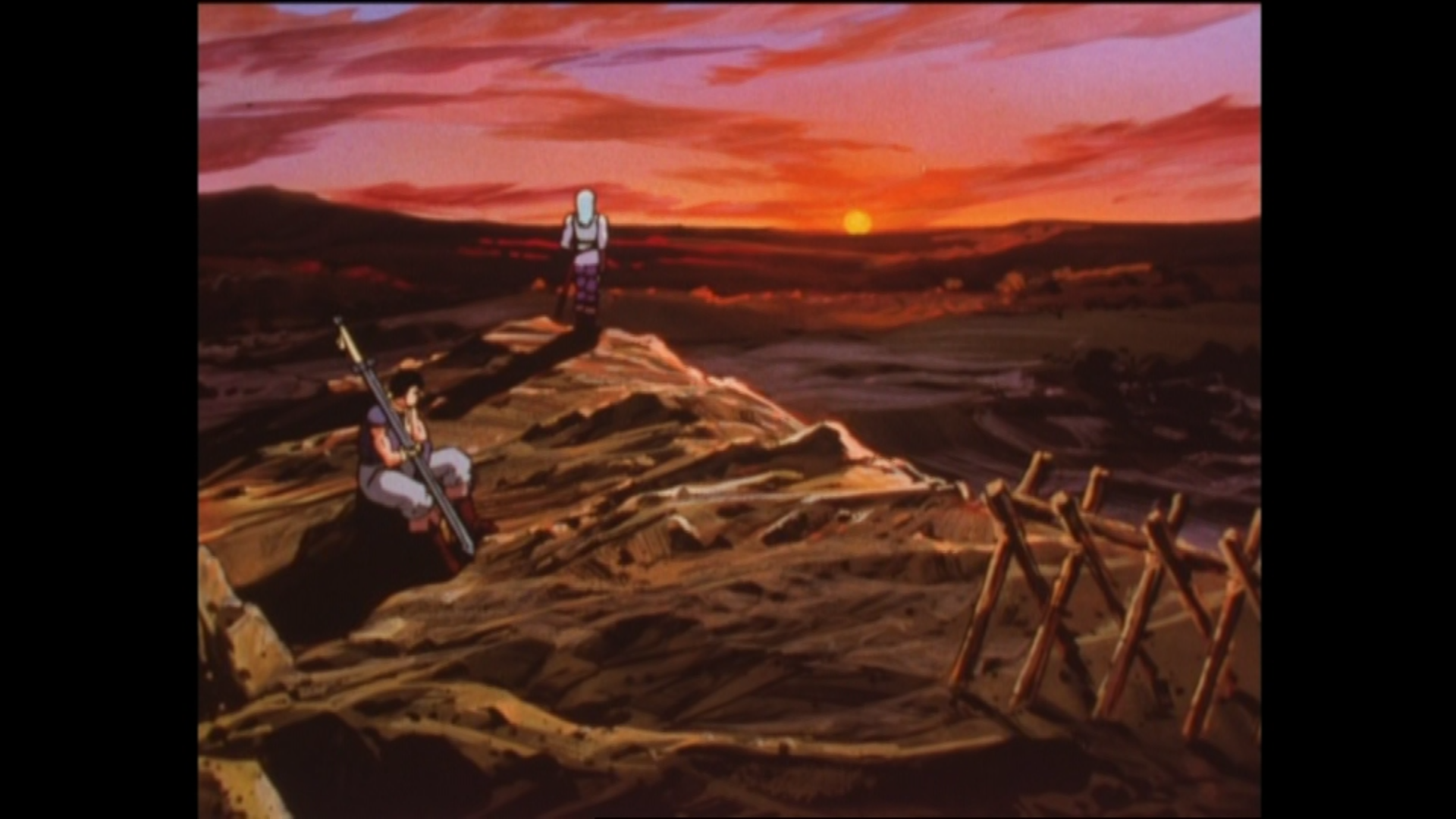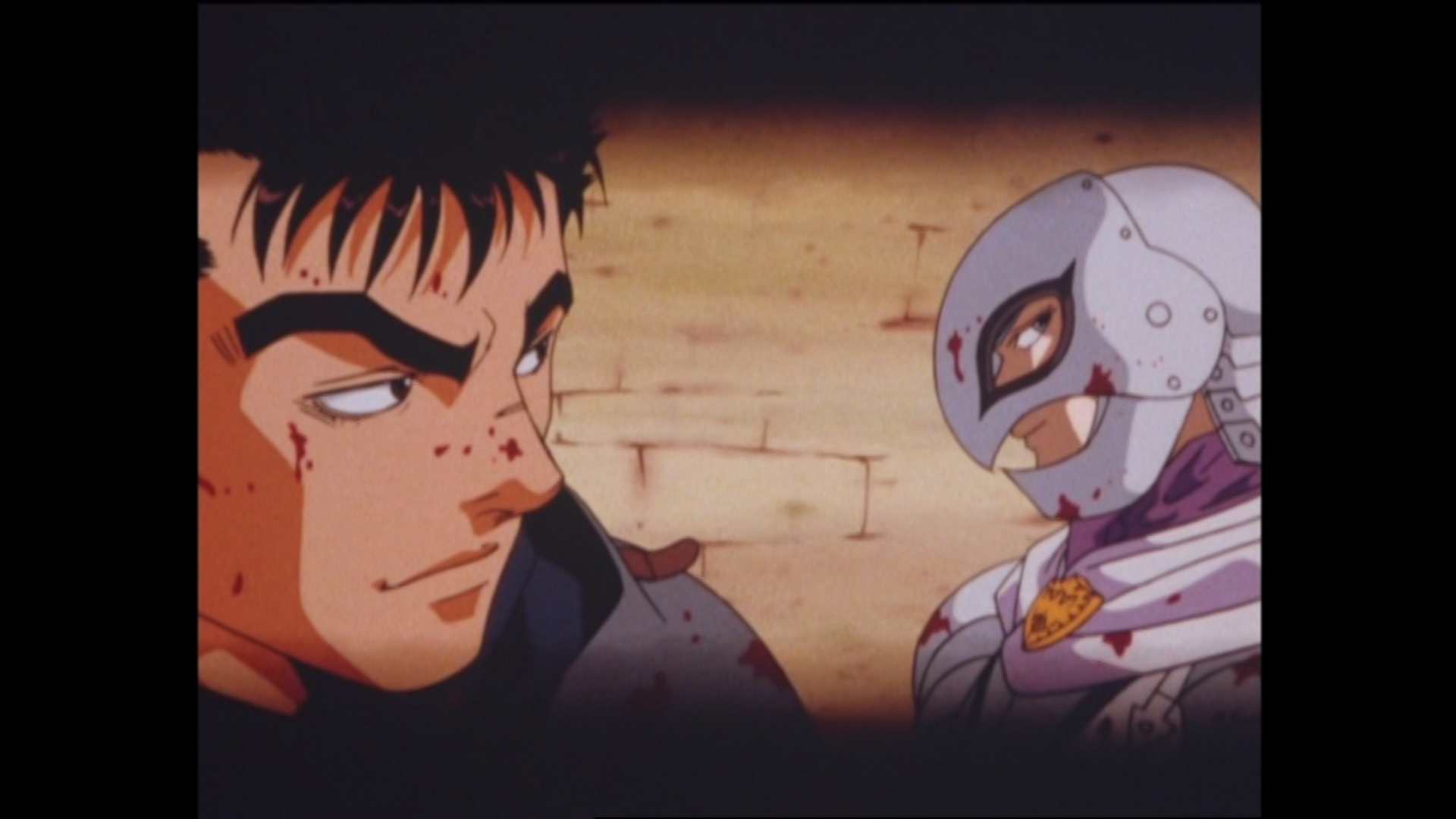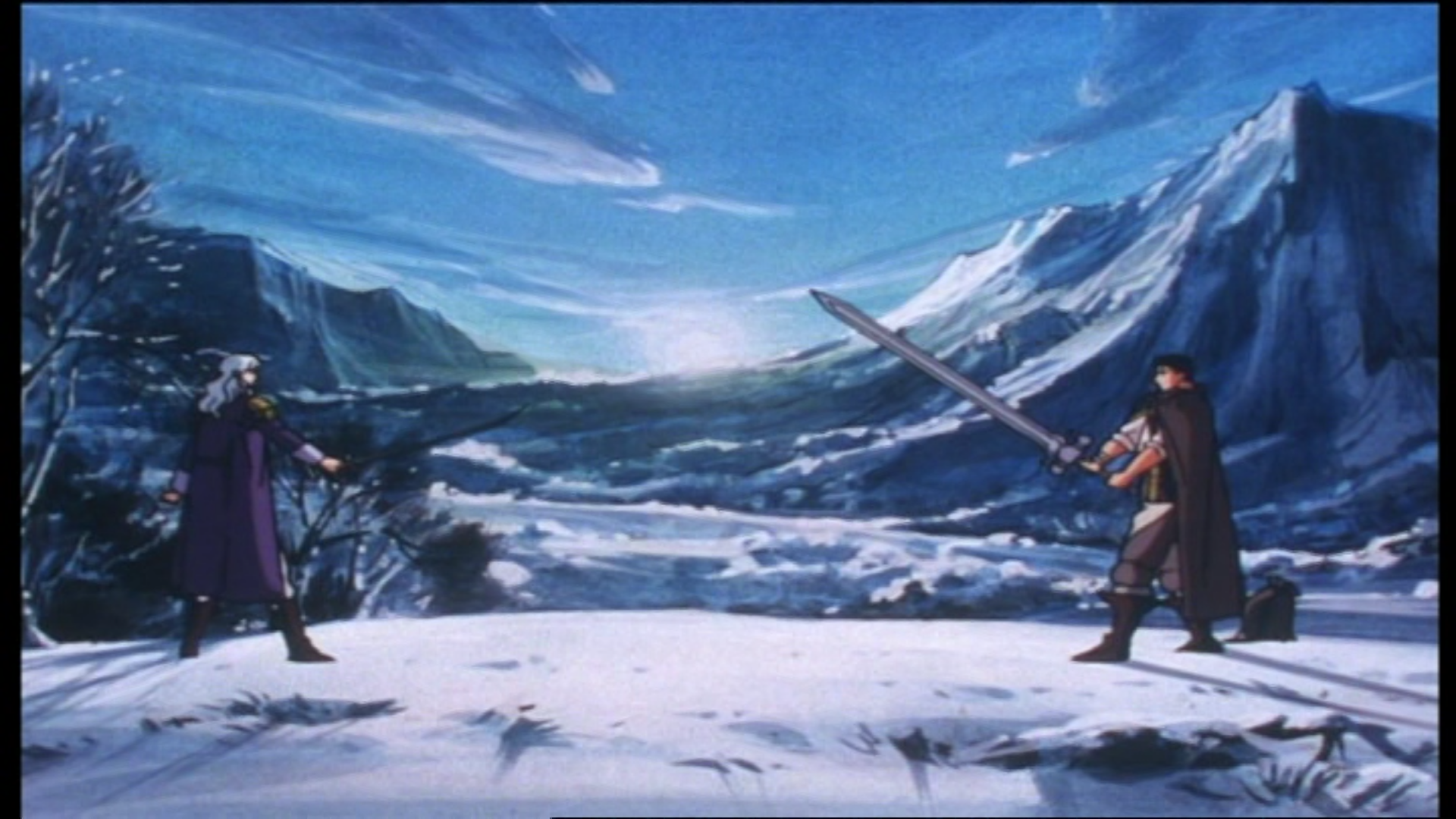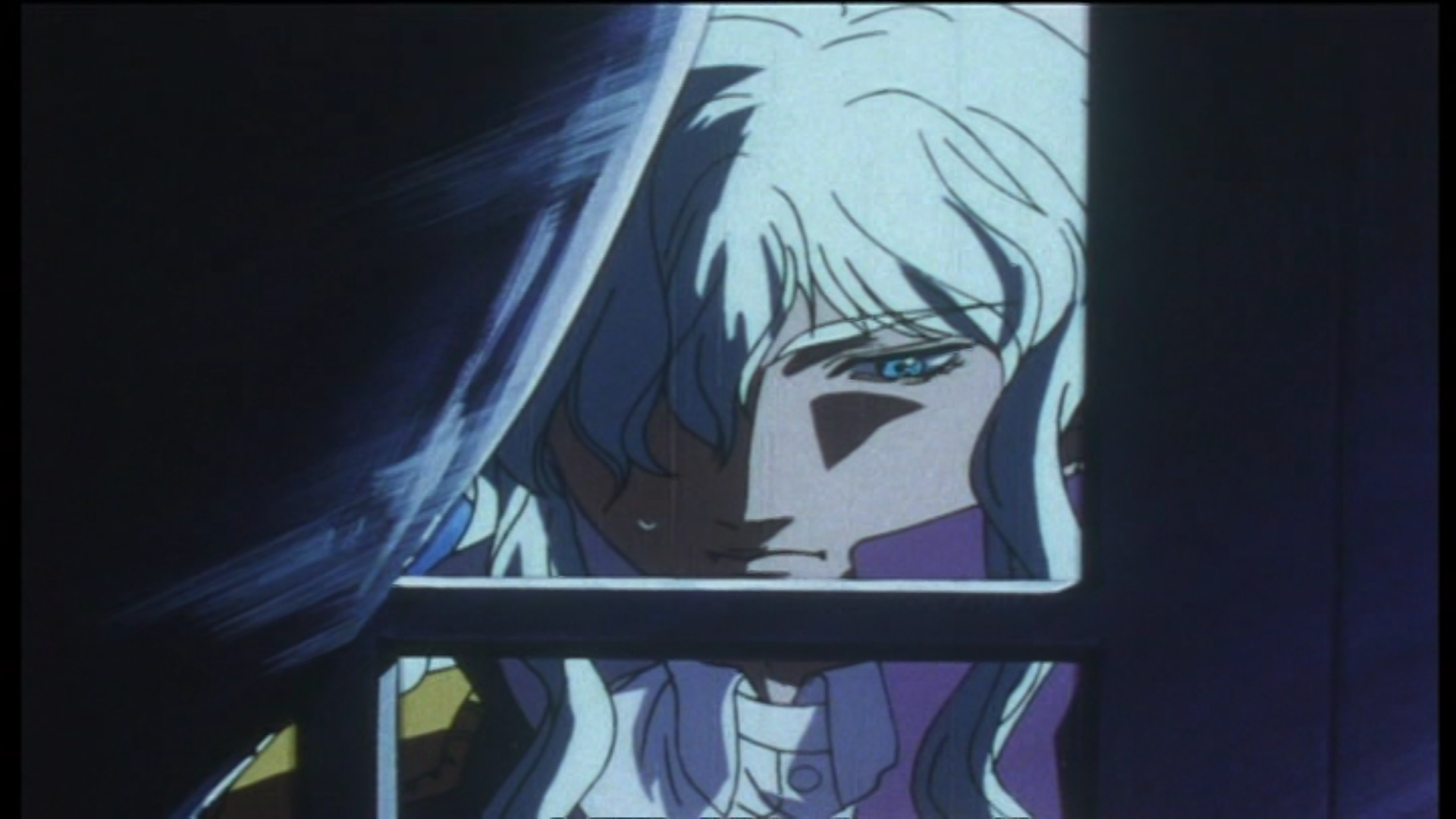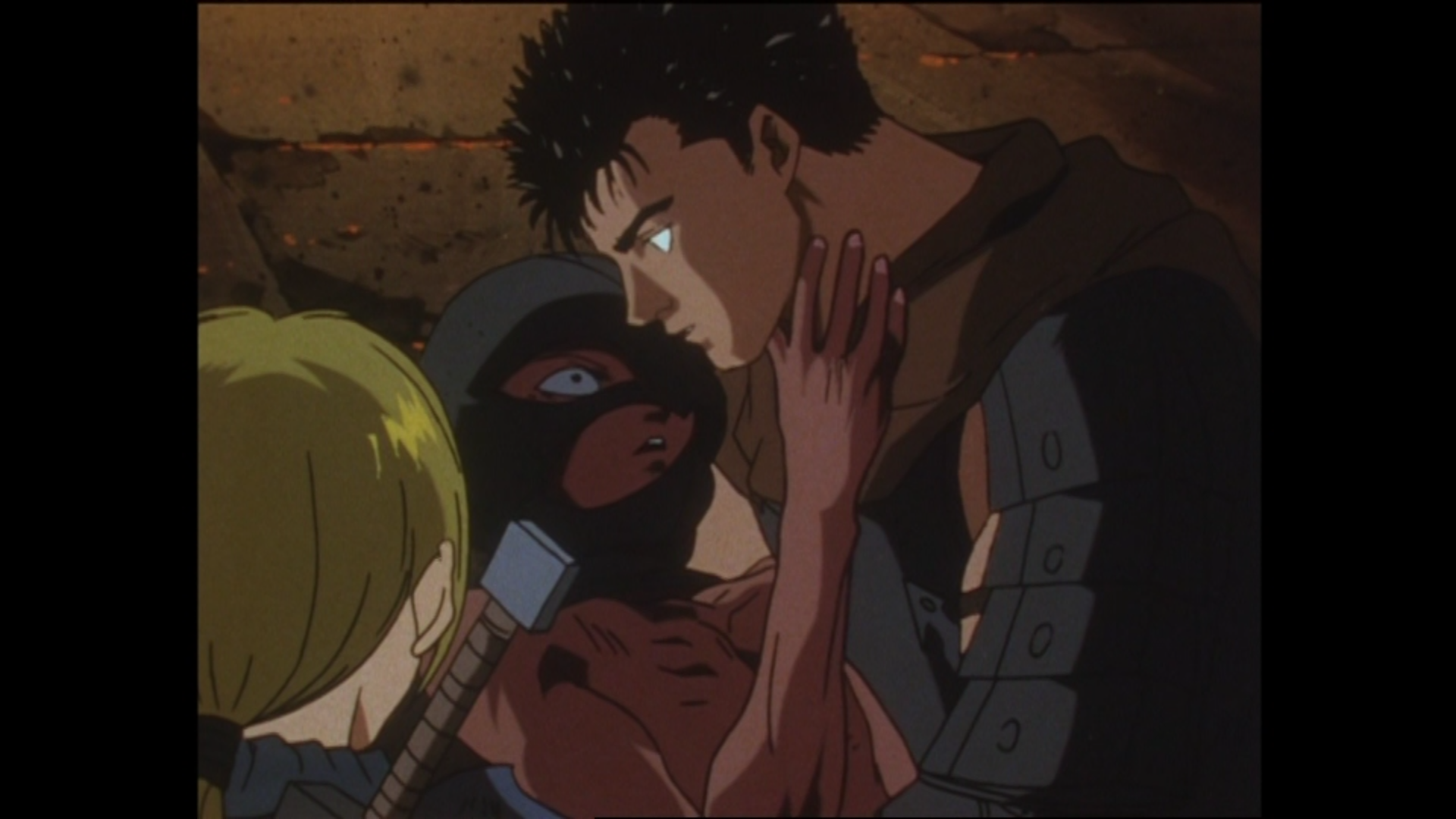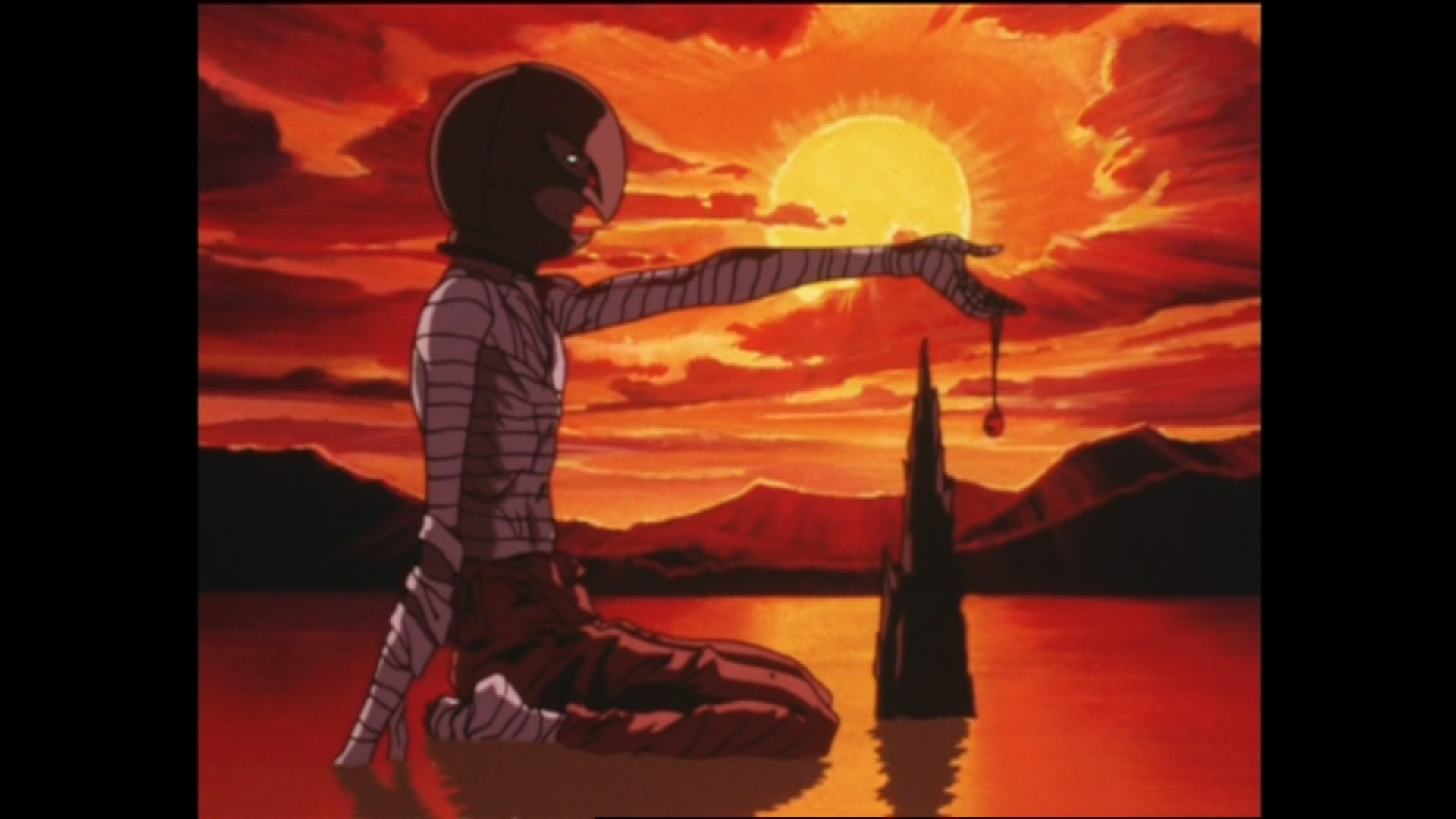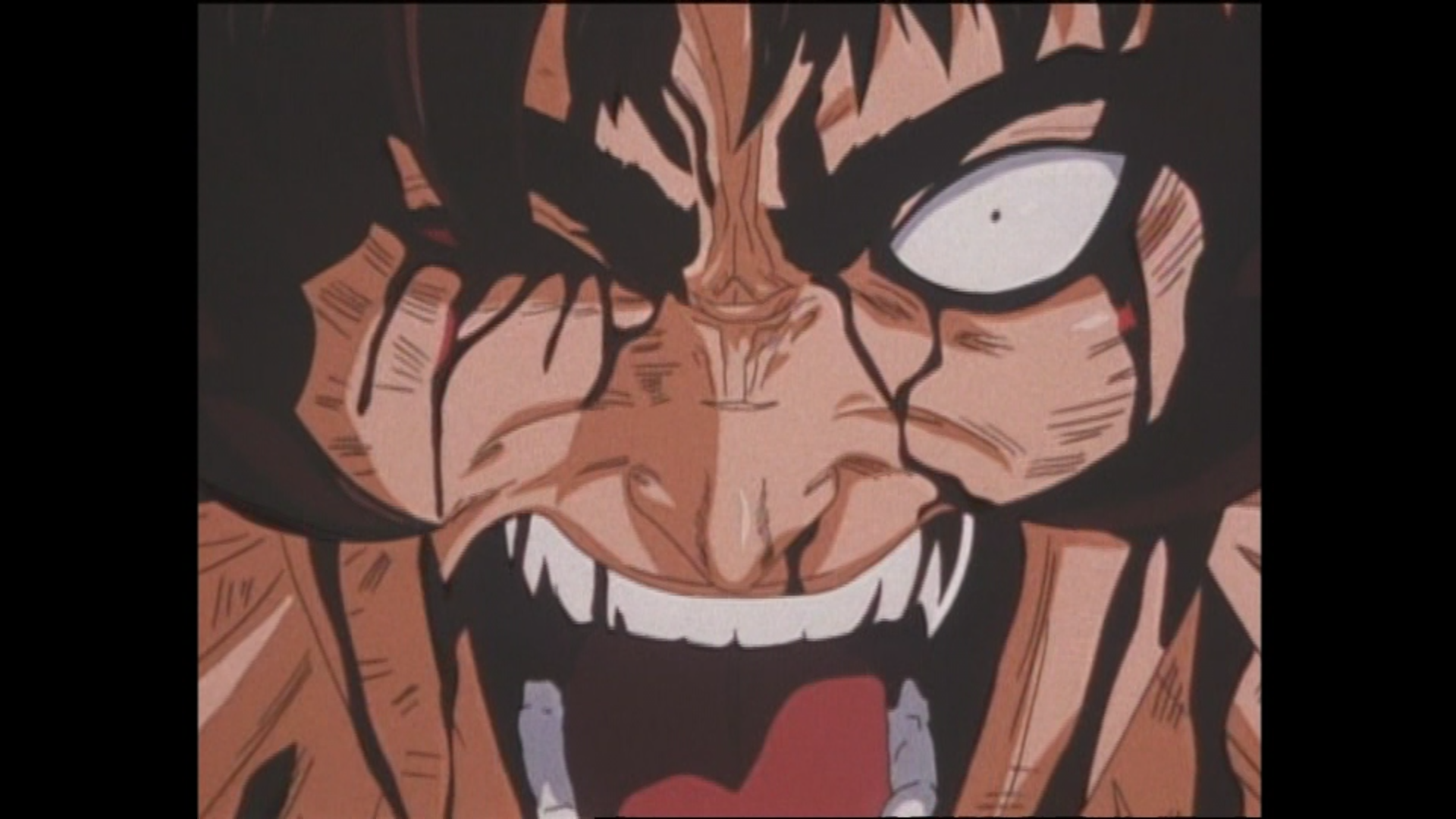This article contains SPOILERS for the 1997 anime Berserk. Read on at your own peril!
After I watched the finale of Berserk, I sat in silence for a while. It's a show I’d best describe as unbalanced, its complex characters contrasting with sloppy writing, and its sheer brutalism subverted by Guts’ invulnerability. It's a show with a hundred battles that messily fade together, and moments of quiet contemplation that shine bright. Mostly though, it's a story about a man and his dream.
Griffith is the driving force behind nearly everything that happens in Berserk. He is majestic, charismatic, beautiful and graceful. He is cold, meticulous, aloof and deadly. There is a persistent air of other-worldliness about him, that absorbs near everyone he comes into contact with. He is the alluring bonfire that others throw themselves into, just so they can become part of his flames.
The anime reveals very little about Griffith’s childhood. We know he received a charm from an old fortune teller, the egg of the king, which would give him the power to rule at the cost of his flesh and bones. And we know that he intends to pursue that power, no matter what the cost is. Griffith starts from zero, a man without any intrinsic strength or political connections, and intends to get everything. Just what he wants to achieve with that influence is unclear, but we can assume he wants to to make dramatic systemic changes.
Griffith assembles a small group of mercenaries, which he names the Band of the Hawk. Using his inherent genius and learned brilliance, he leads them to multiple victories, his group slowly growing until it numbered 500 soldiers. Things were going well - but not every battle led to a flawless victory. Some of his soldiers died.
Of course some died. It would be absurd to think otherwise - war is a messy business, after all. But it hit Griffith hard. One of his soldiers, a mere boy, died with his toy knight still in his pocket. Griffith began to doubt himself. He prostituted himself to an old man, a rich lord, in order to raise funds for his army, in the knowledge that this was a faster and safer way to raise funds than fighting on the battlefield.
His second in command, Casca, confronts him over it. She can’t understand why he would do such a thing. As Griffith explains, coldly and logically, he crosses his arms and grips them with his nails so hard that he tears his flesh.
I think many would assume he is disgusted with himself over the way his body was used. That he is ashamed to be caught out and the depths he must descend to in order to realise his dream.
But the truth is that Griffith does not give a damn about the sex. He tears up his arms in despair over the death of the boy, and the many deaths he feels he will cause as he moves into the future, both enemy and friend. He is only a man, and he can’t love his comrades and expect them to die for him. But nor can he do nothing, and give up on his dream, because that would invalidate the sacrifices of those who had already died.
Griffith finds a way forwards though. He stops thinking of his comrades as friends. He stops loving them, he stops caring about them in any empathetic or compassionate way. He begins to think of them as tools. Not as fodder to be carelessly thrown away, but as valuable and respected items. Griffith is a master craftsman of war, and he’ll use his tools with delicate discretion - but he must maintain his emotional distance from those who give their lives for him if he is to achieve greatness.
It is the only way he can cope. And it works. Griffith’s Band of the Hawk continues its glorious rise. They become known as the Grim Reapers of the battlefield, swift and deadly. Griffith is barely a grown man, but already possesses one of the strongest fighting forces in the Western Kingdom. All he needs to do is keep his cool and his emotional distance, and he will surely succeed.
But one day, In the closing hours of a three month long siege, he spies a young and reckless soldier named Guts.
Guts is the antithesis of everything Griffith stands for. Where Griffith dreams, Guts instead tries to forget. Where Griffith has a long term, coolly calculated plan, Guts lives in the moment of crossed swords, moving endlessly from battle to battle. Where Griffith gathers followers, Guts turns everyone away, seeking isolation from anyone and everyone.
For Guts’ whole childhood, he knew only the way of the sword. He was born on a battlefield from a corpse and raised by a mercenary named Gambino. He was taught how to fight, and nothing else, because his surrogate father had nothing else to teach. Guts took to fighting alongside him from a very young age.
When his father suffered a debilitating injury, Guts had to grow up quickly. He continued to take to the battlefield, earning enough coin to support them both. But his father grew bitter and surly, blaming his injury and the death of his companion on Guts. He tried to kill Guts as he slept, but Guts defended himself, accidentally killing Gambino in self defence. The mercenary band he was with turned on Guts, chasing him out of the camp and into true isolation.
Guts lives for the sparks, that moment of weightless teetering on the edge of life and death. He cares not for causes, family or money - he just craves the euphoric rush that fills him as he fights for his life, time and time again.
Griffith becomes entranced. Guts is a man that defies his understanding of what people can be. He is attracted to Guts’ recklessness and passion, as he seems to be living a type of waking dream every time he throws himself into the fray.
But Griffith cannot afford to have friends. He’s already resolved to see people as tools and to hold himself above them. So instead he asks Guts to join him as his soldier, ‘owned’ by Griffith in every sense. Guts’ initial refusal makes Griffith all the more determined to win his prize - which he does, with a smile on his face as he bleeds from a punched-in face.
Griffith now possesses Guts, and while he has a good pretence for having Guts join his army - his incredible fighting skills - Griffith cannot help but reveal his deeper feelings for Guts through his actions. Griffith may want to remain above illogical human emotions, but throughout their time together his reactions defy his words.
This is one of the special things about Berserk, something I wasn’t able to fully appreciate on my first viewing. The characters lie. To one another, yes, but more importantly, they lie to themselves. So many anime shows have the characters acutely espouse their respective philosophies, neatly summing up their character in a digestible soundbite. In Berserk, these characters cannot bring themselves to express how they genuinely feel.
Guts is eventually promoted to commander of Griffith’s Raiders, a hard and fast hitting cavalry force. He joyously eats and drinks with his men and learns their names, dreams and passions. When a contingent of them are killed, he rages in emotional anguish, torn to pieces over the idea of them being torn to pieces. Yet when Guts explains what he thinks are his true feelings to Casca, he says he only cares for the sword and the sword alone. Guts deliberately distances himself from his fellow soldiers with his words, even as his actions belie his true feelings.
Griffith’s weakness, his secret lie, is his love of Guts. Griffith acts rashly and foolishly when it comes to Guts, saving his life on multiple occasions despite the risk involved. When Guts is in danger, Griffith loses sight of his grand dream. Griffith no longer treats Guts like a tool, but of something of far greater value. Griffith may claim that he will sacrifice everything to attain his dream, but his love of Guts overrides that dream. Griffith isn’t a cold and lifeless machine, no matter how aloof he appears or wishes to be - he is just a man.
As Griffith increases his power and influence, certain members of the court begin to plot his downfall. They resent his lowborn birth and military successes, so plan an assassination. Luckily for Griffith, the attempt on his life is botched, and by following clues he is able to identify the man who tried to kill him. He plans to return the favour.
He calls Guts to his study, and quietly asks Guts to kill a man for him. He then goes into great detail explaining exactly why such a thing is justified, even if that man is Julius, the brother of the King. Guts is bemused, and asks why Griffith wouldn’t just order him to do it. Griffith smiles knowingly, but gives no answer.
Guts is hardly the stealthy type, but manages to sneak into Julius’s manor without any problems. He oversees Julius sparring with his son, attacking the young boy with overwhelming force. Guts is reminded of himself and Gambino, but resolves to carry out the assassination nonetheless.
As Julius’ servant retreats into the manor, Guts unveils himself. He quickly dispatches him and prepares to leave. Before he can reattach his hood and escape anonymously, the door to the library opens. And there stands Julius’ son, a shocked expression on his face, as he looks on in horror at his dead father. Guts, realising there can be no witnesses to the murder, impales the young boy on his sword before he even realises what he’s done. He grasps the boys hand as he coughs up blood and the life slowly fades from his eyes.
I think this was the first point that Berserk really hit me. I didn’t doubt that the world of Berserk was a dark and deadly place, filled with corruption and death. But I didn’t expect the supposed protagonist of the tale, Guts, to murder a young boy, regardless of the consequences of not doing so. It wasn’t a premeditated murder, but neither was it accidental. It was simply what Guts deemed necessary in the moment to best protect Griffith.
Guts escapes from the manor in his typical berserker style, killing 20 guards in the process. He is in a state of shellshock as he tries to process the evil he has done. His normal wry and sarcastic drawl is replaced with silence, and the grim visage of a man full grown reverts to a boyish one, lost and confused. He goes to find Griffith, needing reassurance or companionship or respect.
But Griffith is with Princess Charlotte. And Casca, who has followed him, tells him he cannot join Griffith in the state he’s in, covered in wounds and with common clothing. So instead he stands there with Casca, and overhears Griffith explain to the Princess what someone would have to do for him to consider them a true friend.
““They are my able soldiers. They are important comrades who devote themselves to my dream. However, they are not necessarily my friends. It is my perception that a true friend never relies on another’s dream. A person with the potential to be my true friend must be able to find his reason for life without my help. And, he would have to put his heart and soul into protecting his dream. He would never hesitate to fight for his dream, even against me. For me, a true friend is one who stands equal on those terms.””
Guts, at the lowest point in his life, confused and filled with self doubt, hears from Griffith that he is not his friend. That he cannot become his friend, because he does not possess a dream. He gets confirmation that Griffith does not consider him an equal, but just another tool to be used for the right job. It isn’t true, of course - Griffith cares for Guts deeply, whether he says so or not - but Guts feels that what he says to Princess Charlotte is what he truly believes.
Gut’s exact feelings for Griffith are difficult to pin down. He is in awe of his charisma and majesty. He respects his skills and leadership on the battlefield. He believes that Griffith’s dream is a worthy one, and is envious of him having a clear purpose in life when he has none. He wants Griffith as a brother and comrade and wants to be considered his equal, but I don’t believe he loves Griffith in the same way that Griffith loves him. For Guts, it's a matter of respect, not intrinsically about emotional love.
That respect is so deep that Guts takes this speech to heart. He decides that he cannot sit idly by and be consumed by Griffith’s dream as every other soldier in his command has been. He wants so badly to be a true friend to Griffith that he turns from his nature of pursuing the sparks of battle. He resolves to leave the Band of the Hawk when Griffith achieves military ascension, so that he can become more than merely a tool, so that he can stand shoulder to shoulder with Griffith.
Griffith continues his meteoric rise to power. It culminates with the Band of the Hawk re-capturing a castle lost decades before, a lynchpin stronghold between the East and West Empires. With the castle captured, a long awaited peace is finally declared. Griffith is elevated to the rank of General and his squad commanders are made knights. He has a legitimate path to marrying Princess Charlotte (who is besotted with him) and becoming King, finally realising his dream. Griffith even defeats his political foes in court, using trickery to trap the conspirators in a building before setting it alight. He coldly observes as they burn to their deaths.
Guts has done all that he promised to do. His prowess on the battlefield is no longer relevant - Griffith’s path forwards to realising his dream is now one of politics and seduction, not death and mayhem. Guts was happy to be Griffith’s tool, applied to whatever task Griffith set him to - but now he considered it time to discover and pursue his own dream, so that he could finally stand on equal terms to Griffith, as his friend.
As Guts enters the outskirts of town, his friends try to stop him. Casca, in particular, has developed feelings for Guts after all their time together - although she won’t admit it to herself. As Guts makes his final goodbyes, one more figure steps out of the shadows. Its Griffith.
““I told you this long ago. You are mine. I won you by my own sword. Everything about you belongs to me, from your battlefield to your own life. If you want to get free of my hand, by those conditions, snatch yourself free with your blade!””
Griffith refuses to let Guts go. And the question must be asked - Why? Why not let Guts go with a handshake and a smile, as Guts suggests?
Because Griffith loves Guts. Because Griffith cannot stand the idea of losing him, but at the same time cannot admit to his feelings, because that would corrupt his dream, which he ostensibly holds high above all else.
Both men draw their swords. Silence descends on the clearing, as they stand ready, their eyes unwavering from one another. Just as the sun begins to rise, a small clump of snow tips off a tree branch. As it does, they both lunge, one sword swing that will decide everything.
Guts’ sword cleaves Griffith’s in two, and Guts stops the descent of his sword at the base of Griffith’s neck. Guts has won the duel. Griffith, facing a loss for the first time in his life, and the loss of the man that he loves, falls to the ground in despair. Guts slowly walks away, not looking back.
Griffith becomes distraught and unstable. He has only felt like this once before - when he saw that boy dead on the battlefield, still clutching his toy knight. In losing Guts, he has lost himself - but has no-one he can turn to as a friend. So he lashes out, fast forwarding his plans on the Princess, so that he can escape his immediate feelings.
The snow has passed into a dark storm that consumes the night. Griffith announces himself at the window of Princess Charlotte’s bedchambers, a strange expression on his face, one he quickly masks as she admits him inside. He pushes himself onto her, and they end up tangled on the bed, his hands raising her skirt. He looks into her eyes, and says: “Your fear and sorrow, throw everything into the fire, and let it burn.”
Griffith is not only speaking to the Princess. He is speaking to himself. He later sits at the end of the bed, after Princess Charlotte has fallen asleep, a haunted expression on his face. He hugs himself, reaching up to his shoulders to scratch himself with his nails. He can only think of Guts, and the pain that has been inflicted upon him by his betrayal. He sought to lose himself in the Princess, but it was no help - he is still obsessed.
Griffith leaves early in the morning, but his nighttime activities have been spotted by a maid. He is surrounded and captured, and has no sword to defend himself. Griffith, who meticulously planned his ascension from nothing to the most powerful General in the land, has been undone by his love for Guts. If he had waited a mere matter of months, he could have been formally presented to Princess Charlotte. Instead, he has ruined everything, and his plans lay scattered in ash. He is thrown in jail, and the Band of the Hawk becomes outlawed, reduced to mere bandits once more.
A year passes. Guts journeys, alone, making a few friends along the way. He eventually discovered what his own path and dream should be. He still loves the sword, he still chases the sparks - but he resolves to only raise it for himself, or for the things that he thinks are worth protecting. Before, he would throw himself into any combat, for any reason, for anyone - so long as he could taste life in the thrill of battle. Now he must have a reason, something he decides alone.
He reunites with what is left of the Band of the Hawk. Led by Casca, they’ve been reduced to barely 500 members, the rest having deserted or killed through months of endless skirmishing. Morale is dangerously low and Casca is so consumed with despair she can barely bring herself to eat. They plan to rescue Griffith, and ask Guts for help - but not before Casca confronts Guts in a clearing.
There are some who might say I’ve been remiss in failing to mention Casca more. I’ve largely characterised the plot as being centred around Guts and Griffith. The problem with Casca as a character is that she’s quite underwritten - she is defined more by her relation to the two men than her own personal drive. Her continued utterances of ‘Griffith’ are not unlike the Jon Snow’s endless ‘Mah Queen’ in Game of Thrones. She has a fascinating backstory and is clearly a competent commander, but most of what she does and says is framed in terms of Griffith and Guts, not her own goals or desires.
She lashes out at Guts for what he did to Griffith, calling him stupid for not realising the depth of Griffith’s love for him. But Guts counters, pointing out that he had to leave precisely because of his respect for the man. Griffith and Guts are now two of a kind, both men in pursuit of their own dreams. But Griffith’s idealisation of what constitutes a friend is frighteningly similar to what he perceives as an enemy.
Casca realises the truth of what Guts says. Her anger against guts washes, and she returns to her drained and depressed state. She tries to throw herself off the nearby cliff, but Guts saves her. They finally admit their feelings for one another and make love. They both engaged in an elaborate self deception to avoid the truth of their love. And finally they have the cathartic release of the truth.
Guts says that he will help Casca rescue Griffith and stabilise the Band of the Hawk, but only until they get back on their feet. Then he feels he must return to his wandering, so that he can continue to pursue his dream. Casca yells at him, saying he’s just like Griffith. And if that truly were the case, Guts would have walked away then and there, to train, or to sharpen his sword.
But instead he turns to Casca, and asks her to go with him. He opens up himself, to find room in his dream for one other. Guts will only raise his sword for causes he thinks are worthy - but to him, Casca is a worthy cause, and his love for her is a thing worth protecting. This is the ultimate difference between Guts and Griffith. Guts allows his compassion and empathy to overrule the relentless pursuit of his dream in a way that Griffith refuses to.
With Guts reunited with the squad, they are prepared to finally rescue Griffith. If this was any other program, we would be moments away from a triumphant rescue. If this was a normal anime, the next couple of episodes would see a quiet reconciliation between Guts and Griffith, accompanied by wry smiles and quiet laughter.
But this is not a normal show.
This is Berserk.
There are points in Berserk where the music completely cuts out. It's almost always there, alternating between the haunting flutes of Behelit, the lighter and peaceful Gatsu or the more triumphant battle themes like Forces. But there are points where it cuts to nothing, and lets the scene speak for itself, completely unembellished.
The plan to rescue Griffith seems to be going smoothly. A team of four, led by Casca and Guts, sneaks into the palace and then the dungeon without any problems. They come to Griffith’s door and see him lying still on the ground. At first, they believe him to be dead - but the truth is much harder to swallow.
Griffith has been tortured and maimed to the point where he seems barely human. He has been flayed and starved to a skeletal figure. The tendons in his arms and legs have been severed and his tongue cut out. His head is locked inside a metal cage resembling his hawk helmet. And these are only the obvious injuries.
There is no music in this moment. The characters barely speak. I could only hear the ringing in my ears and feel a deep sense of sickness in my gut. It is rare that a show can make me feel so horrified, but this moment ruined me. That a man as majestic and beautiful as Griffith could be reduced to this frail and fragile being hurt me deeply. Somehow, knowing what he once was beforehand made his current state all the more horrifying to behold.
The squad rescues Griffith. Guts, as usual, kills a hundred enemy soldiers during their escape. There is no sense of triumph despite the success of the mission. Everyone had been expecting the return of the glorious Griffith to save them, and lift them out of their woes. What they got was barely human. With no-one to save them, and Guts and Casca about to leave, what were the Band of the Hawk to do now?
Guts has a conversation with a soldier called Judeau, who asks him what he plans to do next. He assumes that Guts will leave with Casca, and leave the rest of them to fend for themselves. Judeau encourages it. But a group of Guts’ old raiders come over to them, pledging themselves to Guts, asking to be taken along when he leaves. And Guts realises that this companionship is perhaps what he’s been searching for the entire time.
Humans are weak. Or so Casca says so to Guts. We rely on one another to pull us through the bad times, and together we can live, and maybe even be happy. Casca wants to stay and look after Griffith because of his frailty and weakness. Guts says he’ll stay as well. Pursuing a dream to the exclusion of all else is not a way that he can live. Casca pushes back, saying he has to leave, that he has to pursue his dream - how else can he be a true friend to Griffith?
Before they can continue the conversation though, Griffith escapes on a horse drawn carriage. He begins hallucinating, remembering his childhood. He imagines a world where he did not pursue his dream, settling down happily with Casca and raising children. But when he wakes he is sitting in the river, still maimed and without a tongue, as a dark eclipse begins to consume the sky. He tries to impale himself on a thorny stump, but cannot bring himself to do so. And as he sits there in the water, the Behelit, the jewelry piece that is the egg of the king, floats its way into his fingers.
I’ve neglected going into details on the fantastical side of Berserk. It permeates the world, but always in the background, always on the edges of reality. But for all its importance and the repeated utterances of fate , the actions in this story were the result of the hubris and cruelty of men and their inability to understand one another. Now though, as we enter the final few episodes of Berserk, and the Band of the Hawk’s entire world is consumed, we must confront the monsters in all their terrifying glory.
They’re twisted abominations of gnashing teeth and awkward posture, with no single one looking like another. They shamble forwards unrelentingly, shifting in size and shape with every step. They delight in suffering and seem to feed on people’s despair, grinning maniacally as they kill and devour the humans they tower over.
We have already encountered a couple of monsters throughout the series. There is the snake-like monster that Guts slays in episode 1, and Nosferatu, who easily defeats Guts and Griffith during a siege. But those creatures pale in comparison to the new monstrosities that the Band of the Hawk is about to encounter. They may not be as strong, but they are far more gruesomely terrifying, and leave their prey with nowhere to run.
The Band of the Hawk is sucked into another plane of existence, with a dark red sky and the ground beneath them covered in shrieking faces. Monsters litter the landscape, strangely not attacking the soldiers. Griffith is isolated from the band and Guts desperately tries to follow him, to reach him and save him. But we are far past the point where Griffith needs to be saved.
Griffith is hallucinating, or meditating, on his journey up to this point. He considers the sacrifices he has made over his long journey. Griffith has scorched a trail of death and destruction with every step he has taken towards realising his dream. And now, he is finally being offered a path to the power he so desperately desires. All it will cost him is one final sacrifice. The Band of the Hawk...and Guts. And, in doing so, he will perform the final grand sacrifice of his humanity.
Of course he chooses to sacrifice them.
The monsters begin an indiscriminate slaughter. There’s no defeating these creatures, and there’s no escape. The band of the Hawk die, one by one, until only Guts and Casca remain. It's a simple thing to type, but these are the soldiers we have been with for the entirety of the show. And they all die within minutes, scared and with no-one to turn to.
Guts kills scores of the monsters, but they are unending. He eventually falls, but is not killed, his arm clenched in the gaping mouth of one of the creatures. Casca is captured, and stripped. The most horrible act of the endless night is yet to come.
Griffith is reborn as Femto with the final sacrifice of those who loved him the most. And his first act as Femto is to rape Casca right in front of Guts. Guts cries out in anguish, tearing at his arm, but cannot break loose. He tries to break the monster’s teeth to free himself but the monster’s teeth are like diamonds, and his sword shatters. In a final act of desperation, Guts severs his arm with several stabs of his broken sword, but can only take a single step forwards before he is pinned down once more. He is powerless to do anything but watch.
As Femto rapes Casca, he once more stares deep into Guts’ eyes. This is his revenge. For leaving him, for the torture he suffered. For the past year he has thought of nothing but Guts, as he was tortured to within an inch of his life. And now he repays the pain that Guts caused him by raping Casca, out of jealousy and his need for vengeance.
And then the show ends.
So, as the credits rolled, I sat there in silence. To end a show on the apex of suffering is breathtakingly audacious. I’m no stranger to tragedy, but there is usually a cathartic release, a summing up, a lesson learned. You finish watching Berserk and you can do nothing but despair at the endless pain that these characters are all suffering, with their ultimate fates completely uncertain. And yes, there is a short post-credits scene - but that does nothing to diminish the agony of existence that these characters are forever trapped in.
There is a level of raw brutality to Berserk’s ending that I don’t think anyone can prepare themselves for. It's not just that the violence is gory, or that the monsters are horrific. Its that these people who you’ve spent time with, who you’ve grown to love, are killed and raped and tortured. At the end of it all, Griffith had to sacrifice his humanity to achieve his dream.
As the Succubus Demon looks on at Femto, Guts and Casca, she utters the closing dialogue in the show.
““Oh it’s beautiful...how it moves me...Love, hatred, torment, pleasure...Life and Death...All together before our eyes..This is the beauty of man...and the devil...””
How could you feel otherwise after watching Berserk?

